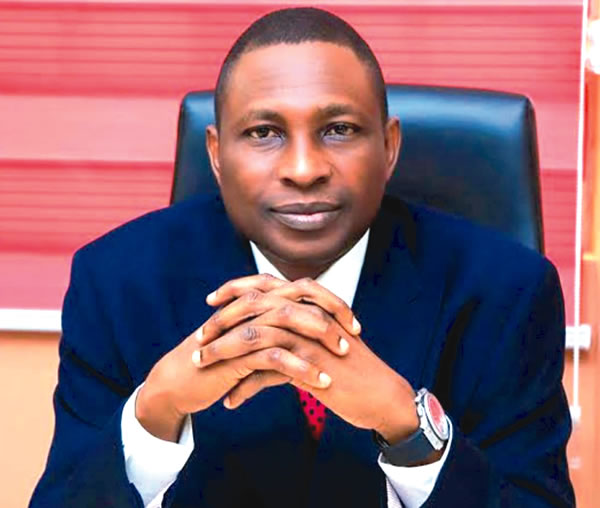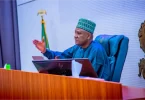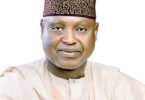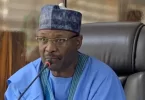The cankerworm called corruption, has no doubt been a major causative factor that has deprived the country of huge sums of resources that should be ploughed into critical sectors to avert the rash of crises that has led to the fret in government circles, KUNLE ODEREMI writes.
NIGERIAN is believed to have lost a staggering N400 billion due to corruption especially in government circle. The losses cut across various critical sectors of the economy such that abandoned projects litter parts of the country. However, there is no exact figure on the amount of public fund that the country has lost to corruption. Various figures are in the domain showing the staggering amount of funds meant for public services lost to corruption among mostly public officials in critical sectors and offices. The Centre for the Study of Economies of Africa (CSEA) claimed that Nigeria loses approximately $18 billion each year to corruption. The country is also said to lose at least $500 million annually to internet fraud, and a report by the National Bureau of Statistics indicated the country lost N700 million to bribery in 2023 alone.
About 22 years ago, the Federal Government established the EFCC. Its creation was received with cautious optimism in some political circles because some perceived it as duplication. High profile cases handled by the new organisation gradually ingrained the EFCC in the subconscious of many people. Dramatic cases involving serving ministers, heads of federal departments and agencies, as well as governors believed to have misappropriated public funds increased EFCC public rating. Unfortunately, the czar later became the hunted as the leadership became soaked in doses of corruption allegations. The rapacious appetite of the corrupt few in its midst tarred the image of the EFCC with the country becoming the cesspools of corruption. While a former Prime Minister of Britain described Nigeria as fantastically corrupt, some of its senior citizens corroborated the worsening scale of corruption in the country, warning that if Nigeria does not kill the cankerworm, it might end up killing the country. But has the commission been walking the talk over the last one year? Is the situation ante the same since the new helmsman came on board?
Much is expected from the EFCC under the leadership of Olanipekun Olukoyede, who is a lawyer, having served the commission as Chief of Staff to the Chairman (2016-2018) and Secretary to the Commission (2018-2023). He succeeded Abdulrasheed Bawa and unveiled his mission and vision for the agency that appears to have become a slippery terrain for whoever becomes the helmsman. “There is need to redirect our focus towards what we were set up to do in Nigeria, which is to drive economic development. We will tilt our focus towards that area. We will work to drive economic development, create wealth and employment,” Olukoyede said. He declared his assets and advised the other officers and men to follow suit. According to some observers, the menace of corruption has waxed in strength over the years because of the lackadaisical attitude or firmness on the part of past governments to tackle the menace frontally. The starting point under Olukoyede was the reform of the anti-graft body to purge it of the peculiar societal vices. The claim by him when he visited President Bola Tinubu in Aso Villa, Abuja, of susceptibility of the agency investigators to compromise cast a slur on its integrity. Therefore, there has to be paradigm shift in the way the agency carries its onerous task of check the menace of corruption. So, there has to be an internal cleansing so that the EFFC can perform optimally, efficiently and effectively to enjoy public confidence in its Herculean task. Besides, the EFCC has to assert its independence because of the perception in some circles that it was under the remote control of the office of the Attorney-General of the Federation.
Sadly, the act of corruption has also been compounded by the connivance of the advanced countries with fraudulent Nigerians as the proceeds of the malfeasance are stached in foreign banks, especially in the Western hemisphere. So, from the culture of 10 per cent bribes in the sixties, successive governments have become big contracts for grabs. Contracts are awarded to undeserving, shadow companies that cannot be traced in the past. The culprits have moved to the level of outright embezzlement, money laundering, drawing salaries of ghost workers, and pension fraud, as well as allegations of forex abuse, round-tripping and dubious acquisition of banks. The rising faces of corruption also include well-intentioned government programmes and policies like the humanitarian programme, such that the school feeding programme is mired in controversy, just as some critical institutions like the Nigeria Police Force are regarded as the cesspool of corruption. Governance is said to have taken a flight in some states with many former state governors, over the years becoming guests of anti-graft agencies to render account of their stewardship painstakingly following corrupt charges. Having left office, they are no longer covered by the immunity clause in the Constitution.
In some states, governance has become business as usual, a peculiar tea party. Former governors, ministers, and top government functionaries are answering charges in court, many years after leaving office. They are in a vantage position to use looted funds to undermine investigation, prosecution, and the entire judicial process. Trials of suspects last a decade and a re-trial is ordered. The prosecutor is fatigued. The case is abandoned. It pales into a waste of time, energy, and public resources.
In the opinion of a right activist, Lanre Suraj, the major underlining reason for corruption is greed and lack of contentment, as well as the craze for opulence. Coupled with this is the rising level of pervert value such that nobody questions the source of peoples wealth, especially those with sudden wealth without having any legitimate means of livelihood. Many are those accumulating money for offspring who would most likely mismanage the stolen wealth in the future. Also, the children of the poor who bear the brunt of corruption are now taking their pounds of flesh as troublers of the same society. Their activities include armed robbery, banditry, kidnapping, and murders. The corrupt gangs are not insulated from the threats to public order and peace.
There is a correlation between corruption and underdevelopment, as funds are diverted, project implementation suffers. It is a huge cost to welfare. The repercussions are also grave. After their reckless looting, the leaders later forfeit blissful retirement and begin to attend courts, some of them at the twilight of life. Lack of contentment made them to steal while in office. In their old age, they do not have peace of mind. Their wealth becomes vanity. Those who have passed on left behind a legacy their children cannot be proud of. According to some observers, that looted funds are still being recovered from a deceased military Head of State to the tune of billions, almost 30 years after his demise, is an indication of how soldiers of fortune have silently ruined Nigeria.
A novel form of corruption between 2003 and 2011 was election rigging, including alteration of results and declaration of losers as winners. The sanctity of the ballot box was violated. The scenario was a prelude to legitimacy crises in some states in the Southwest, the old Midwest, and the Southeast.
The impact of corruption on the image of the country is also serious. Foreign investors are wary of corrupt countries, which they perceive as a threat to business. In their opinion, an atmosphere devoid of bribery, misappropriation, or embezzlement contributes to the ease of doing business.
Beneficiaries of corruption are eager to jump at the opportunity provided by plea bargaining, which makes a thief who has stolen billions to redeem himself in court by paying pittance as fine, thereby escaping jail to continue to enjoy his loot in freedom. According to a report titled: ‘Corruption in Nigeria: Patterns and Trends,’ by the Nigerian Bureau of Statistics (NBS), government officials received N721 billion bribe in 2023. The figure amounted to about 0.35 per cent of the country’s Gross Domestic Product, GDP. The report which was based on a survey conducted with the United Nations Office on Drugs and Crime, stated that the average cash received by public office holders last year was N8,284 an increase from an average of N5,754 in 2019.
The report added: “According to the 2023 survey, the average cash bribe paid was 8,284 Nigerian Naira. While the nominal average cash bribe size increased since 2019 (from NGN 5,754), this does not account for inflation. The inflation-adjusted average cash bribe in 2023 was 29 per cent smaller than in 2019 in terms of what could be bought with the money. Overall, it is estimated that a total of roughly N721 billion (US$1.26 billion) was paid in cash bribes to public officials in Nigeria in 2023, corresponding to 0.35 per cent of the entire Gross Domestic Product of Nigeria.”
The truism is that no society is totally free of corruption. That is why those institutions with mandate to fight the menace are constantly fortified to justify their mandates. So, the battle against it is always a work in progress. To Olukoyede, corruption is the next deadliest affliction tormenting humanity, apart from tertorism. He lamented that most of the former governors being prosecuted today were those who could not pay minimum wage. To expose more corrupt officials, he urged Nigerians to embrace whistleblowing, adding that it should be backed by consistent commitment. The EFCC chairman elaborated on his anti-corruption crusade at the stakeholders’ meeting held at the Unity Fountain in Abuja to commemorate this year’s African Anti-Corruption Day.
The highlight of the event was the ‘Road Walk’ by employees of the EFCC and other stakeholders in the anti-corruption corridor. Olukoyede led the walk from the Wuse Two zonal office of the commission, through the streets of Maitama, before terminating at the Unity Fountain. Speakers at meeting also included the representative of the Chief of Defence Staff, Air Vice Marshal Etim Markus; Nigeria Security and Civil Defence Corps (NSCDC) Director-General, Controller of Nigerian Correctional Service, and Director-General of the National Youth Service Corps (NYSC). Olukoyede said urgent and concerted steps should be taken to kill corruption, adding: “Aside terrorism, corruption ranks as the next deadliest affliction of humanity in every region of the world,” he said. The EFCC chairman said the battle should be embraced by all Nigerians as a collective responsibility. Olukoyede emphasised that the battle cannot be won through lip service, emotional outburst or mere mob campaigns. He stressed: “There is need for commitment, passion, consistence and credibility of intelligence. Every whistle blown must point towards truth and evidential proofs.”
The chairman said in view of the danger and threat to existence which corruption represents, it is imperative that individuals, communities and corporate bodies should join hands to tackle it frontally. He emphasised that the fight against corruption required absolute commitment to integrity and unfaltering focus and called on the Nigeria Labour Congress (NLC) and civil society organisations to be part of the anti-graft war, saying that most of the governors being prosecuted today were those who denied workers their reward for labour.
Many stakeholders agreed that a successful battle against corruption can only be waged through joint efforts. NLC President Joe Ajearo said the union will fully support the EFCC in its fight. The Chairperson, Conference of Civil Society and Coordinator Civil Military Co-operation (CIMCO), Adams Otakwu, commended the agency for galvanizing Nigerians to stand against the menace. He said: “It may interest us to know that upon all the threats to national security, inclusive of terrorism, insurgency, proliferation of small arms and light weapons, the most insidious of them is corruption and that is why the fight against corruption must be tackled head on .”
Apart from the challenges of the economy and security, many are of the view that President Bola Tinubu has to reinvigorate the anti-graft war in the national interest. His administration has promised Nigerians many developmental and poverty-reducing programmes. To analysts, the recovered looted public funds can be deployed to the implementation people-oriented programmes without recourse to borrowing.
Also, security experts believe that instead of looking forward to the arrest of corrupt officials, institutional frameworks for preventing sleaze should be strengthened in the public service. Loopholes should be effectively plugged, those who have stolen should not be allowed to go scot-free to mock Nigeria and what has been taken illegally should be retrieved from them. Physical contact with cash should be discouraged in favour of automated processes and systems. The step taken by the President in suspending his Humanitarian Affairs Minister, Beta Edu, over allegations of corruption is laudable. The anti-corruption battle should not be a respecter of persons, big or small. It would serve as a deterrent to others to be more careful and imbibe the right values. Ministers, special advisers, other aides, and top civil servants are likely to adjust to the body language of the President, particularly his inclination towards tough measures against reckless financial activities.
Speedy prosecution of suspects in special courts or tribunals, and adequate punitive measures, including recovery of the looted funds, long jail terms, and a ban from politics, may be more effective. But, media trial of suspects should be discouraged. The commission should uphold the core values of the EFCC, which include integrity, courage and professionalism.
There is a need to reduce corruption to the barest minimum because national survival and global reputation rest squarely on how far the country can go in the fight against graft. Between October 2023, when Olukoyede was confirmed, and January this year, EFCC has recovered N70, 556,658,370.5. In a document titled: ‘Operations and Recoveries’, the recovery is as follows: N60,969,047,634.25, $10,522,778.57, £150,002.10, €4,119.90; bringing it to N70,5 billion within the first 100 days. Within the same period, 3, 325 petitions were received, and 2,657 accepted; 747 persons were convicted for money laundering and internet fraud. Olukoyede said there would be no hiding place for economic saboteurs. Remarkably, EFCC has tried to crack down on businesses and others transacting in dollars. The chairman had also taken his sensitisation and enlightenment programmes to schools, urging students to shun cyber crimes. A commentator, Ayodeji Seriki, believes Olukoyede will succeed, if he does not deviate from his vision and mission. He said: “The three focal areas are: focus on the mandate of the EFCC, pursuit of transparency and accountability and building the image of Nigeria. To achieve these, he has dwelt on the need for collective responsibility, greater emphasis on preventive frameworks against graft and premium attention on transactional credits.”
READ ALSO: #EndBadGovernance protests: Flying of Russian flag, calls for military coup treasonable — Police







